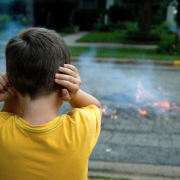Loud Yet Easily Overlooked: Noise Pollution in Dorms and Apartments
It was about 11 PM, and, after a long day of moving in, I was more than ready to sleep. However, the street just outside my window was booming with loud music and sounds of people chatting, putting a good night’s sleep just out of reach. It was only the first night in my apartment and I could not help but worry that I might have to deal with sleep-disrupting loud noise throughout the school year.
Whether you are living on the Hill or in an off-campus housing arrangement, my experience may sound familiar to you. According to this study, one of the top five reasons why college students lack sleep was dorm noise. In addition to lack of sleep, living in a noisy environment can negatively affect our health in other ways as well. However, there are many strategies to combat noise pollution and prevent it from negatively affecting our health.
What is noise pollution?
Noise pollution is unwanted or disturbing sound. It can include anything from the loud music coming from your neighbor’s room to the sound of a lawn mower to audible conversations down the hallway. While it may not be something many people think about seriously, noise around us is a part of our daily built-environment that can threaten our health and disrupts our quality of life.
Noise pollution and physical health
Noise may be a risk factor for cardiovascular disease. This research found that exposure to noise pollution increases blood pressure, changes heart rate, and causes release of stress hormone. This may be because of the emotional stress reaction as body perceives discomfort from the noise and nonconscious physiological stress resulting from the interaction between the central auditory system and other regions of the central nervous system.
Noise pollution and mental health
Noise also may affect mental health. While there is no direct association between exposure to noise and mental health conditions, it may contribute to a wide range of symptoms such as anxiety, stress, nervousness, and emotional instability. Another study demonstrated an association between noise level and aggressive behavior.
Noise pollution and sleep
Lastly, yet perhaps most importantly, noise disturbs a good night of sleep. More specifically, noise may cause difficulty falling asleep and frequent awakening, which lead to sleep deprivation and number of other negative health consequences such as depressed mood, decreased cognitive performance, and fatigue.
What Can We Do?
One option is wearing ear plugs when you are sleeping. You can grab them for free from the Powell Reading Room behind the CLICC desk.
Another option is to communicate with your roommates and/or neighbors. Discuss with your roommate(s) about each other’s sleeping and studying habits and what each other’s comfort level is. Agree on what works for you and your roommate(s). If neighbors next door or upstairs are the source of loud noise, let them know as well. I personally had an instance in which I had to talk with neighbor upstairs about their noise level and was able to resolve the issue by opening up a discussion.
Noise pollution, especially in college living environment, is a loud problem, yet often overlooked. Being mindful and respectful of people around you could be a great first step. When we communicate with one another and are intentional about our behaviors, we could easily make our living space quieter and healthier.
Miso Kwak is an undergraduate student at UCLA majoring in Psychology with a double minor in Disability Studies and Education Studies. In addition to blogging for the UCLA Healthy Campus Initiative, she plays the flute with the UCLA Woodwind Chamber Ensemble. Outside of school, she works as a mentor for high school students through Accessible Science, a nonprofit organization that facilitates science camp for blind youth.

